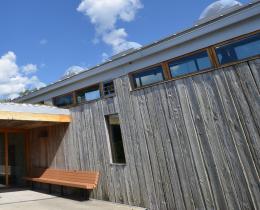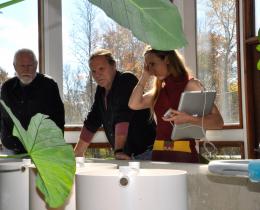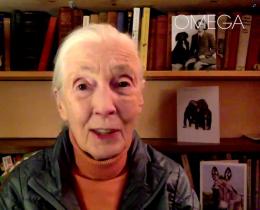During the 2014-15 school year, researchers conducted a first-of-its-kind nationally representative survey of science educators focused on climate change.
What they found was disturbing.
Despite the growing gravity of the climate crisis, and the bedrock function schools play in developing policy assessment skills in society, teachers spent an average of between one and two hours on climate change per academic year.
The survey of 1,500 teachers in all 50 states also found that 30 percent of the respondents said they told their students that global warming was the result of naturally occurring causes—the opposite of the worldwide, scientific consensus that it is caused by human-induced greenhouse gas emissions.
"In a democracy," the researchers from Penn State and the National Center for Science Education wrote, "the ability to participate in governance at all levels is a right and a responsibility. Scientific literacy will play an unusually important role as citizens participate in the crafting of policies designed to slow global warming or mitigate its effects."
Introducing a New Center for Climate Education in New York's Hudson Valley
A new local effort is seeking to broaden that participatory capacity not just in students, but also in teachers, school administrators, and the wider community. The Dutchess County Board of Cooperative Educational Services (BOCES) has established a Center for Sustainability and Climate Education in partnership with Omega and other organizations. Its mission is to engage and empower all K-12 educators, students, and communities through learner-centered curricula and experiential learning. Joining Omega as founding partners are the Ashokan Center, Cloud Institute for Sustainability Education, and Mid-Hudson Teacher Center.
Inspiration for the BOCES center grew out of the 2019 Drawdown Learn Conference presented by the Omega Center for Sustainable Living (OCSL). The BOCES Center's mission aligns with the OCSL's Climate Initiative, which seeks to bring about not only institutional changes, but also expanded local, regional, and international partnerships.
"We are honored to be a founding partner in this innovative effort, as both a convener and facilitator of bold ideas through climate education," said Lauren Mathis, assistant director of the OCSL. "We look forward to empowering students, teachers, families, and communities to envision and ensure a healthy and just future for our planet, together."
The center will offer a range of support through conferences, workshops, learning communities, student activities, and other events focused on:
- Leadership development and strategic planning, including a sustainability audit to assess how districts can improve on teaching and learning; policies and procedures; community outreach; and buildings, grounds and transportation.
- Professional learning opportunities for educators and community members, including an introduction to the Education for Sustainability framework, the program developed by longtime OCSL faculty Jaimie Cloud.
- Curriculum design, development, and evaluation, including a focus on project-based learning that can be incorporated into existing units of study.
- Student empowerment and engagement, including an introduction to biomimicry, the design and production of materials, structures, and systems that are modeled on biological entities and processes.
Dutchess BOCES provides shared educational programs and services to the county's 13 public school districts accounting for nearly 39,000 students.
Drawdown Learn Conference Inspires Early Discussions
At the Drawdown Learn Conference, Joseph Phelan, then the superintendent of the Rhinebeck Central School District, was moved by what he learned about the state of climate education and the empowering value of a solutions-based approach to climate change. Phelan brought his concerns to his Dutchess County colleagues, which sparked discussions of ways to better integrate climate education into the local schools and, ultimately, the creation of the center.
"Once the center is up, running, and fully functional," Phelan said, "my vision is that it will influence many of the school districts, schools, and public school students in the region to learn more about and advocate for the adoption and implementation of sustainability practices and climate education curricula that will have a positive impact on improving and saving our planet for future generations."
Phelan is one of two individual partners helping to guide the launch. He is joined by Dorna Schroeter, a retired coordinator of PNW BOCES Center for Environmental Education who participated in both the 2018 and 2019 Drawdown Learn Conferences.
In a statement announcing the center, Dutchess BOCES Deputy Superintendent Cora Stempel said BOCES feels "an urgency around sharing information and getting districts involved in sustainability and climate change” and highlighted the role Omega and other organizations have played in the early discussions.
“There are a number of groups with expertise and interest in the area," Stempel said. "We all met and, as a result, BOCES made the commitment to start a center."
Local Effort Is Linked to Global Strategy
When leaders of the world's nations met in 1992 to formulate the United Nations Framework Convention on Climate Change, they agreed that climate education and empowerment are key pillars of any global strategy to reverse global warming. Their commitments to promoting public education, awareness, training, and participation are detailed in Article 6 of the UNFCCC and, later, in the Paris Agreement. However, with rare exceptions, little action has been taken to meet those commitments.
A 2019 poll conducted by National Public Radio found that just 42 percent of U.S. teachers mention climate change even though eight out of 10 parents want it to be taught. The survey found that most believe climate change should be taught not just in science classes, but across a broad spectrum of subjects.
Kellianne Ticcony would agree. Ticcony graduated from Rhinebeck High School, was a presenter at the 2019 Drawdown Learn Conference, and now studies marine science and sustainability at Stony Brook University. She said she found climate education "lacking" in high school.
"I taught myself most of the climate education through YouTube, internet research, and opportunities separate from school," she said. "I found that while a few climate issues are outlined every year, they are very repetitive and basic....But there was not much expansion and ideas like biodiversity conservation, intersectional environmentalism, and the impacts of consumerism."
She said that even in her high school environmental science class, many urgent facts were not shared.
"For example, the Paris Agreement was not mentioned," she said. "And instead of focusing on current issues and climate solutions, we spent most of our time reviewing basic biology concepts such as photosynthesis."
Ticcony said she is concerned that without a broader understanding of the ecological crisis, fewer students will be willing to take action to solve it.
"Environmentalism should be incorporated into every subject," she said, "because it is interconnected with everything."



